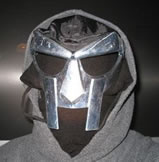
It was with eager anticipation that I ran home with issue #7 of Marvel Comics’ mini-series, “Civil War.” Issues #1-6 had been revolutionary. For one thing, they represented the first series of its kind to be grounded on Earth. All the prior “everyone comes together and fights” series, from Secret Wars (which brought us Spiderman’s black costume) up through D.C.’s latest Crisis (which killed Superboy and renovated The Teen Titans and the JLA), have cosmic storylines that are hard to follow and usually aren’t true to the overall spirit of the fictional universe. Other than Iron Man’s quick decision to embrace what seemed like a fascistic proposal that all superbeings register with the government (and the decision of the X-Men—who’ve lived underground all their lives and, in a future, have been the sole source of anti-Sentinel resistance—to stay out of the fray), the Civil War series has not compromised the integrity of Marvel’s characters and, more importantly, has not changed their personalities to fit the storyline.
This remains true in book 7, but boy was I disappointed. I guess I’ve been trained to love a happy ending, which this doesn’t give us. But more than that, I never thought that Marvel—a company founded upon the principle that everything old must be broken and remade—would end the story by showing us that if these vigilantes would just register with the government everything would be okay. Within months, the world is on the brink of utopia. I know the House of Ideas will spend the next year or so breaking it all down and trying to rebuild the universe to something like what it once was, but absent global amnesia Peter Parker will never be a “secret” identity again. The charm of Spidey was the element of the average: A loving Aunt, an inept lovelife. They’ve slowly been “maturing” him, and the books haven’t gotten better as a result in my view. And the new Avengers are now a team of B-listers (including Ms. Marvel and The Sentry, not including Captain America, Hulk, Spiderman, Wolverine, which are Marvel’s flagship characters). Can they really be called “Earth’s Mightiest Heroes” if nobody who doesn’t read comics every month can pick them out of a lineup?
There’s something to be said for D.C. It doesn’t change much: Superman is still wearing tights with a red S (although he did flirt with a Jesus Christ hairdo for a while). Batman still has a utility belt. Martian Manhunter is still lame. But this consistency is what allowed the generation before me to pass its love of the funnybooks down and share the experience. It’s what allows me to sit down with my little boys and read Justice League to them. If Marvel takes too much of that away, it runs a serious risk of losing touch with what makes comics so great. It’s not the violence. It’s not the new costumes or the revolutionary issue that kills a major character. It’s that, time and again, we get to see Spidey put on a rubber costume and punch out Electro while doing a bad stand-up routine. It’s the expected, not the unexpected, that we ultimately look for in our books.
So, Marvel, please don’t take that away!


